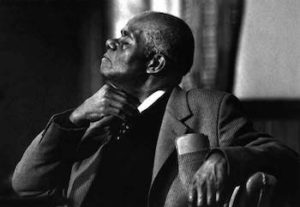
John H. Clarke
John Henrik Clarke, born on New Year's Day, 1915, was a Black historian, writer, and educator.
He was born in Union Springs, Alabama, into a family from a long line of sharecroppers. The family moved to Columbus, Georgia, when he was four. Clarke taught the junior Bible class at a local Baptist church as a young man. He noticed that although many Bible stories "unfolded in Africa...I saw no African people in the printed and illustrated Sunday school lessons."
Clarke started the research that took him to libraries, museums, attics, archives, and collections in Asia, the Caribbean, Europe, Latin America, and Africa. He gathered his findings into books on such figures as the early 20th-century mass movement leader Marcus Garvey, into articles with titles like "Africa in the Conquest of Spain," "Harlem as Mecca and New Jerusalem," and many books including American Heritage's two-volume "History of Africa." He brought his findings to life in discussions with Black audiences hungry for history so long lost, stolen, or strayed. While he taught at Hunter College in New York and Cornell University in the 1980s, Clarke's lesson plans became well known for their attention to detail. They are so packed with references and details that the Schomburg Library in Harlem asked for copies.
In 1985, the year of his retirement, the newest branch of the Cornell University Library—a 60-seat, 9,000-volume facility—was named the "John Henrik Clarke Africana Library." Clarke once wrote, "History is not everything, but it is the starting point. History is a clock that people use to tell their time of day. It is a compass they use to find themselves on the map of human geography. It tells them where they are, but more importantly, what they must be."
Dr. John Henrik Clarke died in New York City on July 16, 1998. Though he was blind towards the end, he still lectured and wrote books.
Africana: The Encyclopedia of the African and
African American Experience
Editors: Kwame Anthony Appiah and Henry Louis Gates Jr.
Copyright 1999
ISBN 0-465-0071-1